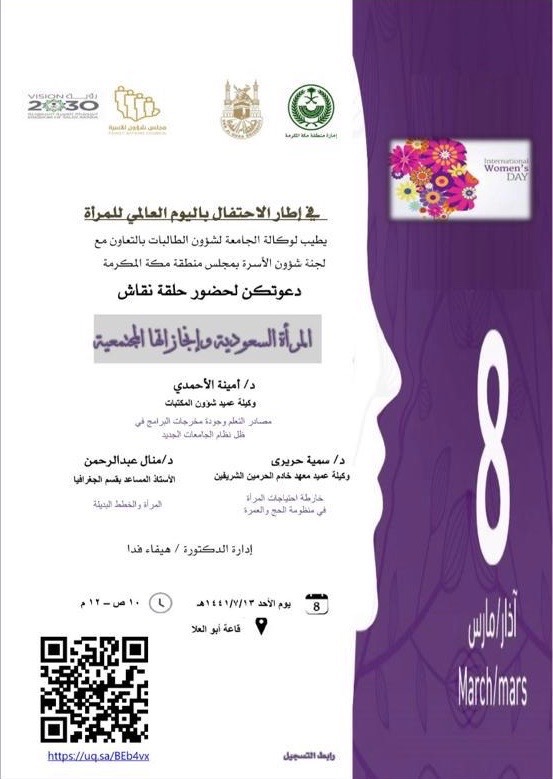
In celebration of the International Women's Day, Umm Al-Qura University tracked the achievements of Saudi women in various societal activities in support of the development fields, according to the Saudi Vision 2030 programs, especially woman's support of man in serving the guests of Al-Rahman coming from all over the world. This came as part of a panel discussion organized by the Vice Presidency for Student Affairs today, in cooperation with the Family Affairs Committee of the Makkah Region Council, in Al-Ela Hall, at Al-Zahir campus.
The Vice Dean of the Custodian of the Two Holy Mosques Institute for Hajj and Umrah Research, Dr. Sumayyah Hariri, elaborated on the institute’s contributions in establishing a specialized project to draw "a map of women's needs in the Hajj and Umrah system". This is to benefit from the services of Makkan women in the areas of health, inspection, and translation. In addition, women's role in voluntary work with regard to outreach and guidance was considered, and how to utilize these through the correct channels, in cooperation with the competent authorities, to determine the needs of the pilgrims and overcome the difficulties they might face. Improving the services provided to the pilgrims was another target, in line with the Saudi Kingdom's efforts to facilitate the religious pilgrims' journey and enrich their cultural experience.
The Vice Dean of Library Affairs, Dr. Aminah Al-Ahmadi, stressed the role of learning resources in employing women's scientific capabilities and enriching the outcome of personnel in the university. This is through knowledge production based on high standards that serve the practices of the different sectors of the system, in order to realize the goals of the new system of Saudi universities.
On her part, the Assistant Professor in the Department of Geography, Dr. Manal Abdul-Rahman, clarified the effect of empowering efficient women in the fields that support the kingdom’s goals, and their involvement in alternative strategic plans to develop economic resources and reduce oil consumption during the coming years. This could be achieved by utilizing the capabilities of women, who have taken the lead in proving their development capacity and raising their economic participation rate from 19.4 to 23.2, at a growth rate of 20% in two years.